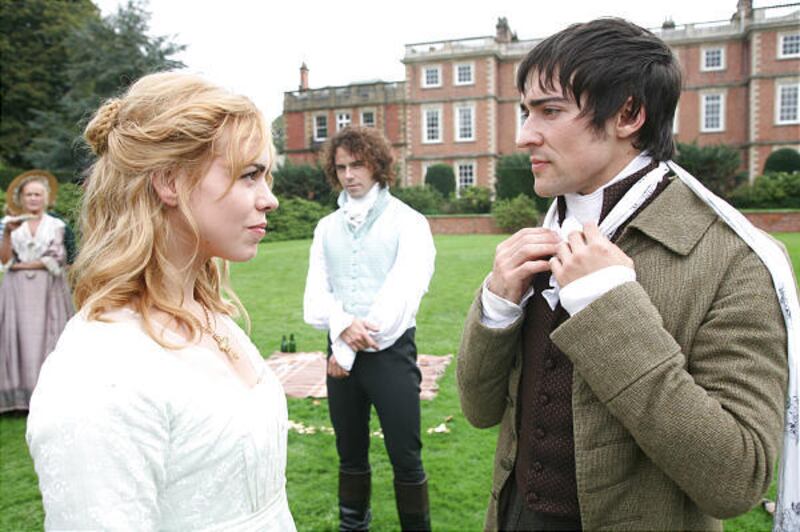“Emma.” comes to the big screen this week. And yes, the period after the name is intentional.
This adaptation of Jane Austen’s classic novel is far from the first and unlikely to be the last. So why did director Autumn de Wilde choose to end the film’s title with such decisive punctuation?
“There’s a period at the end of Emma because it’s a period film,” de Wilde told RadioTimes.
For those who might find it hard to believe the filmmakers chose to add a pun to the title of a beloved Jane Austen story, de Wilde added, “It’s true!”
It’s not a given that an adaptation of the book “Emma” should be a period piece — after all, one of the most popular movie versions of the story is the solidly ’90s movie “Clueless,” which is set in a Beverly Hills high school.
But de Wilde’s version is meant to be a more straightforward take on the source material, to the point that actress Anya Taylor-Joy, who plays Emma, wears “true-to-the-period gowns that are not always flattering” throughout the film, according to the New York Times. “One has a neckline so high that it appears to be choking her.”
“My goal was never to modernize” the story, de Wilde told the Times, “but only to humanize.”
This is a broad goal for a story that features one of Jane Austen’s most difficult to like heroines. In fact, Austen herself called Emma “a heroine whom no one but myself will much like.”

Despite this, “Emma” continues to live on in a way that some of Austen’s other novels have not. “Emma” has been adapted for the screen more often than any other Austen novel besides (of course) “Pride and Prejudice.” The success of “Clueless” shows that the story continues to work even without the trappings of bonnets and petticoats and country balls.
When de Wilde was questioned about why we need another adaptation of “Emma,” she had a ready answer.
“No one would ever say that about ‘King Lear’ or ‘Romeo and Juliet,’” she told the New York Times. “When something is as well-written as ‘Emma,’ there are endless possibilities to grab on to with your interpretation.”
Where will ‘Emma.’ land among Jane Austen movies?
Time will tell where de Wilde’s “Emma.” ranks in the wide range of Jane Austen adaptations after it comes to theaters on March 6. Austen fans have long loved to debate which version of “Pride and Prejudice” or “Sense and Sensibility” is best, and no doubt “Emma.” will be included in the conversation before long.
To help give you a better idea of where each of these adaptations ranks, we’ve compiled a list of the top three best and worst screen versions of Austen’s novels, as based on their scores from movie rating site Rotten Tomatoes.
To keep in the spirit of “Emma.” as a period film, only those set in the Austen era were considered. This means we excluded modern day retellings like “Clueless” and the Bollywood musical “Bride and Prejudice.”
According to Rotten Tomatoes, the three worst Jane Austen adaptations are:
‘Pride and Prejudice and Zombies’
For some reason, inserting zombies into Regency-era England was not very successful. As a movie critic for The Guardian put it, “It feels like anti-fan-fiction.”
‘Mansfield Park’

Starring a post-“Doctor Who” Billie Piper, a movie critic for the Associated Press called this miniseries version of “Mansfield Park” “a disappointingly muted affair in which the 18th century tale of poor Fanny Price and her life with wealthy relations plays out predictably.”
‘Sanditon’
“Sanditon” is based on a novel that was unfinished before Austen died, and so this PBS miniseries finishes the story for her. The series manages to “fluff and stretch Austen’s original 11 chapters into oblivion,” according to a critic for The Hollywood Reporter.
And the three best Jane Austen adaptations, according to Rotten Tomatoes, are:
‘Love & Friendship’
“Love & Friendship” is based on the short novel “Lady Susan,” which was completed but unpublished before Austen’s death. A New York Post critic called “Love & Friendship” “the sharpest, least sentimental and possibly the best version of Austen yet.”
‘Sense and Sensibility’
This 1995 version of “Sense and Sensibility” is packed with British stars, including Emma Thompson, Kate Winslet, Hugh Grant and Alan Rickman. “This movie, made with love and wit, reminds us how much charm, liveliness, passion, good sense — and sensibility — Jane Austen provides,” according to a critic from the Chicago Tribune.
‘Pride and Prejudice’
Perhaps one of the biggest debates among Austen fans is which adaptation of “Pride and Prejudice” is best: Is it the 1995 BBC miniseries starring Colin Firth as Mr. Darcy? Or the 2005 film with Keira Knightley as Elizabeth Bennett? Well, according to Rotten Tomatoes, it’s neither — this 1940 version of “Pride and Prejudice” (starring Laurence Olivier and written by Aldous Huxley) is the only Austen adaptation on Rotten Tomatoes to have a rating of 100%.


